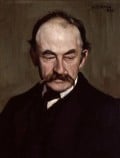Thomas Paine: Apostle of Freedom Review

PART ONE
The biography that I chose to read was Thomas Paine: Apostle of Freedom by Jack Fruchtman Jr. In addition to Apostle of Freedom I've read The Age of Reason, sections of the Rights of Man, Common Sense, select Crisis Papers and numerous letters to and from Thomas Paine to other Founding Fathers. Jack Fruchtman Jr. introduces the book by talking about his love of history, and of Thomas Paine. He also gives acknowledgements to the many professors that helped him further his knowledge of Paine's history. Fruchtman begins the biography with a brief overview of Paine in his twenties. He talks about how Paine dropped out of school, became a privateer on the ship The King of Prussia, and got a job as a tax collector in his home town of Thetford. He then begins to describe Paine in the American Colonies before, during, and after the Revolutionary war. Fruchtman gives an in depth analysis on Paine's minor and major works of writing, and also on his relationship with the other Founding Fathers related to what event was going on during that time. He talks about the stirring effect of Common Sense, the spirit revamp caused by the Crisis Papers, and the hatred brought about by The Age of Reason. In the last part of the biography, Fruchtman's book takes a sharp turn. He begins to talk about how Paine was sent to prison in France during the Terror, and almost executed by Robespierre, for stating his views against the killing of Louis the 16th. He recounts Paine’s return to America after the Terror, and how, with the publication of The Age of Reason and his view on the new government in the colonies, Paine is hated by all of the people around him. The book ends with Paine's funeral, consisting of 6 people (and unknown woman and her son, a Quaker, and two freed slaves) seeing as how Paine "had lived long did some good and much harm. (Paine's obituary)"
PART TWO
The author’s thesis can be stated as: "He [Thomas Paine] wrote and said things that distinguished him as one of the great original thinkers, whose observations seem intensely relevant even today. But Thomas Paine was not a political philosopher. He was a progressive journalists and statesmen who thought that his duty was to expose wrongs as well as the stupidities and frailties of his fellow human beings (AOF pg.1).” I feel that Jack Fruchtman Jr. provides enough information to fully substantiate his thesis. He explains that Paine is not a political philosopher because of his revolutionary views regarding organized religion, racial equality, and government. Paine expressed his views on organized religion as soon as he stepped foot on American soil. He did this through his job at the Pennsylvania Magazine, for which Paine wrote many short stories such as "The Tale of the Monk and the Jew Versified." In this short story a Monk happens upon a Jew that is stuck under ice, yet will not help him out of the ice unless he converts to Christianity. This short publication helped to show "His [Paine's] later abhorrence for the mythologies created by priests to blind mankind of the true nature of religious faith and belief(AOF pg.48)." This short story foreshadows Paine's publication of The Age of Reason, which expresses his radical views regarding organized religion. Paine sent a copy to Benjamin Franklin for revisions, but Franklin responded with, " I would advise you, therefore, not to attempt unchaining the tiger, but to burn this piece before it is seen by any other person; whereby you will save yourself a great deal of mortification by the enemies it may raise against you…(Letter from Franklin to Paine)" Paine also held radical views on racial equality, while many people in the South were slave owners, “Paine wrote that slavery was a "monstrous" outrage, a "barbarous usage". There were many evils attending the practice: as selling husbands away from wives, children from parents, and from each other in a violation of sacred and natural ties(AOF pg. 51)." Paine was also a supporter of women's rights, minority movements, social security for the elderly and life insurance for the young. Lastly, part of what led to Paine’s demise were his views on government. Paine supported a Lockean version of government and because of this he believed in separation from Great Britain. This thought contrasted with the social majority, including the Founding Fathers, who then wanted reconciliation, "Despite actual combat, however most Americans believed that the proper end of tensions between the colonists and the monarchy was through a negotiated settlement (AOF pg.59)." Paine's views were expressed in his pamphlet Common Sense, where he stated that, “We have it in our power to begin the world over again. (CS pg. 120)." Also Paine, possibly due to his lack of schooling, wrote this pamphlet in such as way as to appeal to the commoners in the colonies. Due to the large amount of people that were able to read this pamphlet, Common Sense became a bestseller, however it was copyrighted many times and "Paine never realized a pennies profit from it (AOF pg.63)". Even after the Revolution, Paine still carried his anti-tyrannical views on government. When the Founding Fathers became the head of the new government Paine made a very strong effort to make sure that the new government would still stay for the people and not become corrupt. After his job in America was done he felt the need to travel to other countries and help them gain Independence, he expressed his views to Ben Franklin who stated, "Where Liberty is, that is my country," and Paine replied, "Where liberty is not, that is mine."
PART THREE
Overall, this was a well written biography that gave a very good description of Thomas Paine's life. I also agree with the conclusion that this biography was trying to reach because I feel that Thomas Paine is more important than many people believe him to be. Paine is considered a second tier Founding Father because of the relations he had with the people in America, not solely due to his contributions. This can be shown through this quote from Thomas Jefferson, " Go on then in doing with your pen what in other times was done with the sword: shew that reformation is more practicable by operating on the mind than on the body of man, and be assured that it has not a more sincere votary nor you a more ardent well-wisher…" This shows Jefferson's admiration of Paine, but why then did only six people attend his funeral. Thomas Paine was hated by the federalists for his view on little to no government; he was hated by the clergy for his anti-aristocratic views, hated by slave owners, the founding fathers, politicians, and almost all of France. This book did not contradict anything I have read in previous texts, because in many of the textbooks that I have read, there is no opinion on Paine; in fact, he may not even be mentioned. All this book did was further my knowledge on Paine, and gave me reasonable information that supported my personal opinion of him. In terms of bias, I had a hard time detecting any. Fruchtman states what he feels that Thomas Paine did wrong, and what he feels that he did well; I do not believe that this was intentional bias on the authors part because it is impossible not to show any. Fruchtman states in the introduction and acknowledgements, all of the professors and people that have helped him to discover his love for Paine. He first thanks his professor from Johns Hopkins, named Dr. J.G.A Pocock, who helped him to write his first book on Paine titled, Thomas Paine and the Religion of Nature. He then goes on to acknowledge many friends, teachers and family members that serve as the inspiration for Apostle of Freedom. Even though this book was very intriguing, I feel that there were many places that it could have been improved. In many cases, Fruchtman references many historical events, yet does not explain what happened during them. He then goes on to explain the effect this had on Paine, and only in the later chapters do you learn what happened during this event (one occasion was the controversy over Silas Deane). I feel that he should include a brief outline of what happened in these events before he explains its impact, because it was very easy to get lost in his writing if you did not know what events were going on during the specific time period. Also, I found that Fruchtman jumps from time period to time period, and then back again. After a while, I tended to get lost, and found myself reading information and not knowing when it happened. This caused it to be difficult to make connections between Paine’s actions and what was going on in the world. It is oblivious that Fruchtman has read many stories, articles, conversations, and books on Paine, because he beings to stop writing in his own words and uses mainly Paine’s words to end and begin his sentences. I do not mind this stylistic technique every once in a while, yet after beating it into the ground, It becomes overwhelming. It is understandable that Fruchtman wants to tell Paine’s story through the life of Paine and his writings, but for the most part I feel that it would have been helpful to include less and analyze more. Even though this book, like every other, had its quirks, I enjoyed this reading and was pleasantly surprised by just how much I liked it. Right from the start it caught my attention and did not let it go. Paine has a very interesting life and the author portrayed it well. He proved to me that I chose right in picking Thomas Paine, and I can say that I learned a lot of information on the other Founding Fathers as well. I would highly recommend this book to the people that are interested in broadening their knowledge on late colonial history because it doesn’t only talk about Thomas Paine but includes information about the Revolution that I would not have known, if I had not read this biography.







